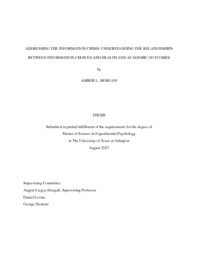
ATTENTION: The works hosted here are being migrated to a new repository that will consolidate resources, improve discoverability, and better show UTA's research impact on the global community. We will update authors as the migration progresses. Please see MavMatrix for more information.
Show simple item record
| dc.contributor.advisor | Liegey-Dougall, Angela | |
| dc.creator | Morgan, Amber L | |
| dc.date.accessioned | 2023-09-27T16:30:10Z | |
| dc.date.available | 2023-09-27T16:30:10Z | |
| dc.date.created | 2023-08 | |
| dc.date.issued | 2023-08-10 | |
| dc.date.submitted | August 2023 | |
| dc.identifier.uri | http://hdl.handle.net/10106/31728 | |
| dc.description.abstract | In today’s society, the prevalence of the “share first, question later” mentality has become a norm. However, this approach to information can have severe consequences when it comes to information seeking behaviors, and health and academic outcomes. Previous research has already illustrated that people are not very good at evaluating information, they prefer to surround themselves with confirming viewpoints, and accepting health misinformation can adversely affect one’s health. Building upon this knowledge, the current study aimed to investigate whether people have preferences in the information they use and their potential implications for health and academic outcomes. Specifically, it was examined how these preferences relate to and potentially shape the impact of prior beliefs and behaviors regarding information searching and evaluation. Although the study did not establish a direct link between these preferences and health and academic outcomes, it did reveal that individuals do exhibit preferences for certain information traits, influencing their engagement with and acceptance of information. Furthermore, the findings emphasized the contextual nature of information preferences, suggesting that strategies for information dissemination and evaluation need to be tailored to specific topics or domains to effectively engage people. The findings also further substantiated the importance of developing information literacy skills to improve health outcomes and academic success and addressing biases in information seeking behaviors. | |
| dc.format.mimetype | application/pdf | |
| dc.language.iso | en_US | |
| dc.subject | Misinformation | |
| dc.subject | Health outcomes | |
| dc.subject | Academic outcomes | |
| dc.subject | Information subgroups | |
| dc.subject | Information users | |
| dc.subject | Information choices | |
| dc.title | Addressing the Information Crisis: Understanding the Relationships Between Information Choices and Health and Academic Outcomes | |
| dc.type | Thesis | |
| dc.date.updated | 2023-09-27T16:30:10Z | |
| thesis.degree.department | Psychology | |
| thesis.degree.grantor | The University of Texas at Arlington | |
| thesis.degree.level | Masters | |
| thesis.degree.name | Master of Science in Psychology | |
| dc.type.material | text | |
| dc.creator.orcid | 0009-0001-9578-0526 | |
Files in this item
- Name:
- MORGAN-THESIS-2023.pdf
- Size:
- 4.743Mb
- Format:
- PDF
This item appears in the following Collection(s)
Show simple item record


